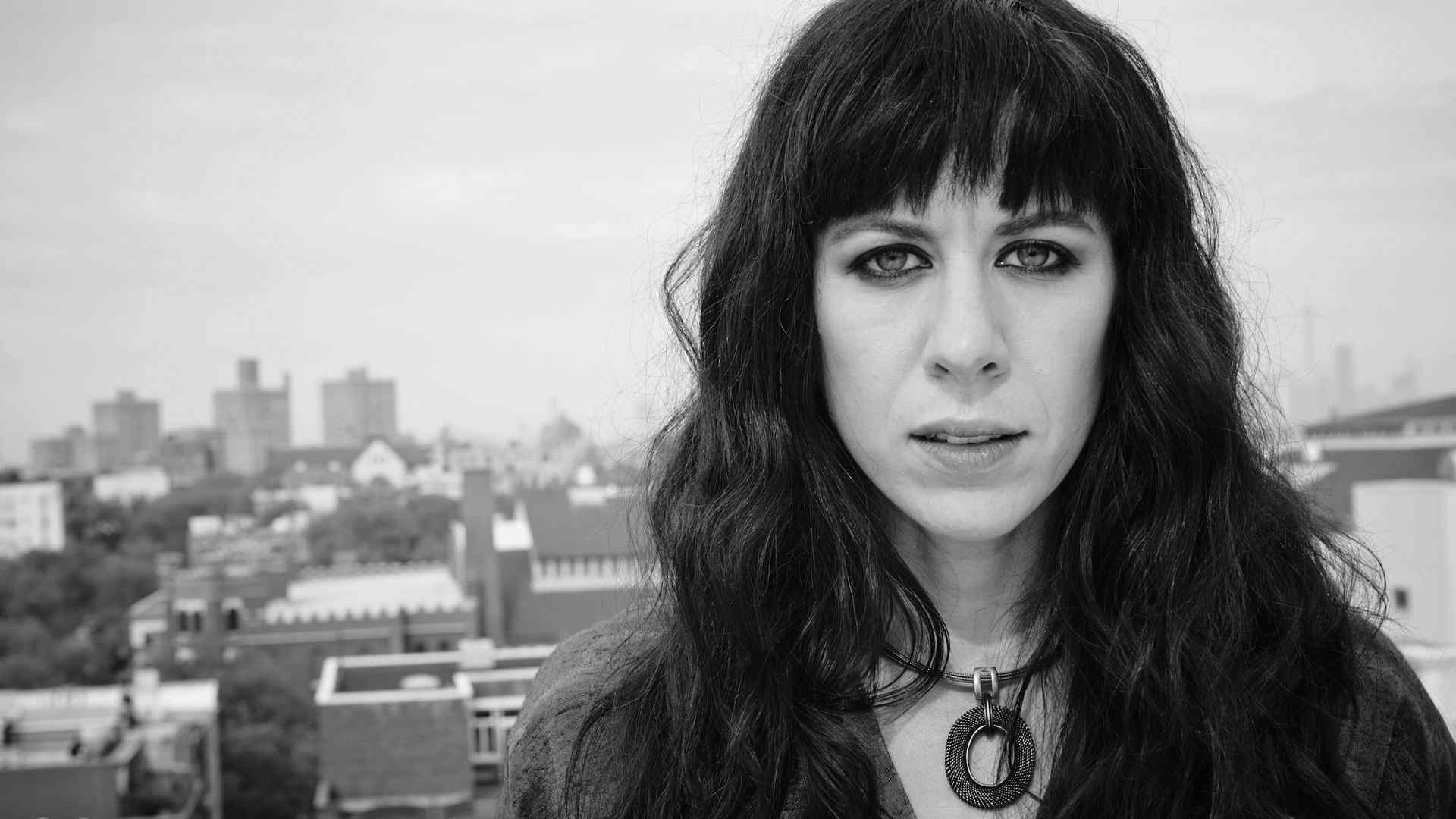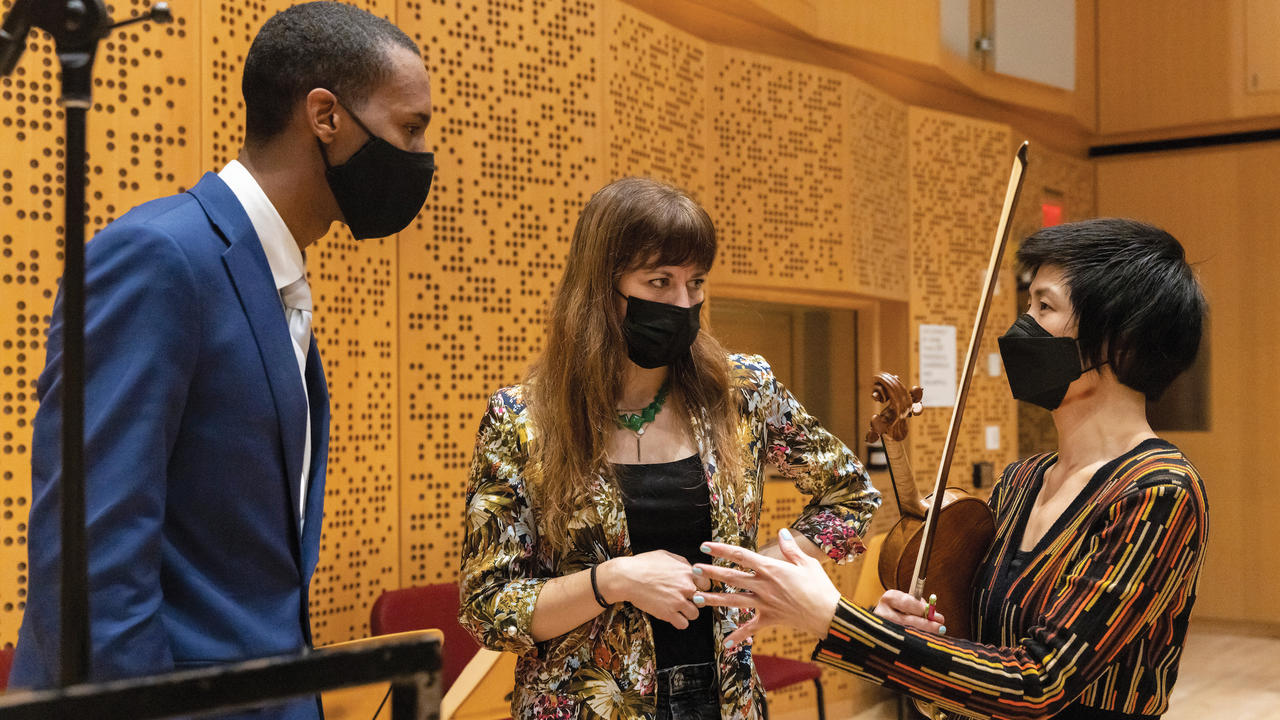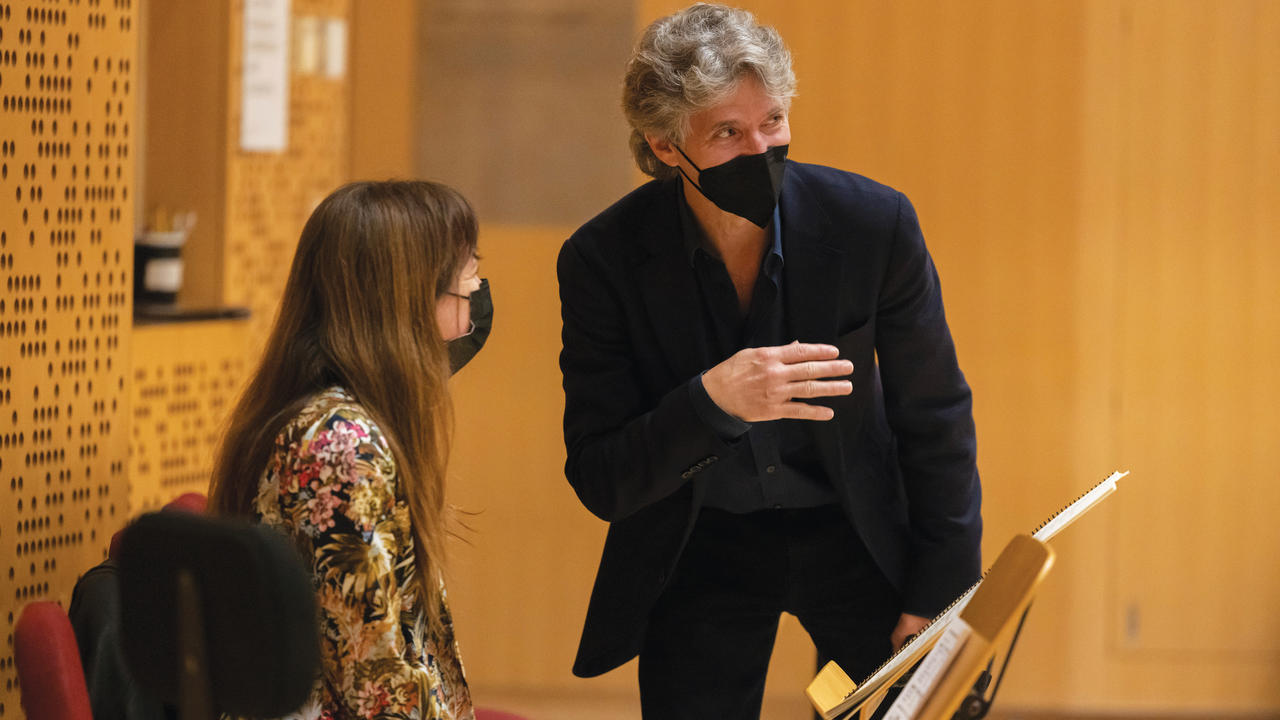
Juilliard Opera presents Missy Mazzoli’s Proving Up
The production, directed by faculty member Mary Birnbaum and conducted by Steven Osgood, takes place February 15, 17, and 19. The February 19 performance will be livestreamed at juilliard.edu.
Mazzoli wrote Proving Up, her third opera, with librettist and longtime collaborator Royce Vavrek, in 2018. A co-commission of the Washington National Opera, Opera Omaha, and Columbia University’s Miller Theatre, the work considers the meaning and achievability of the American dream through the lives of the fictional Zegner family. Despite their best efforts, the Zegners find themselves impoverished and undermined by fate as they strive to “prove up” and, per the Homestead Act of 1862, acquire the deed to their five-year-old Nebraskan settlement.
Mazzoli spoke with Journal assistant editor Joshua Simka (BM ’14, voice) about the opera, her creative process, and finding ways to open careers in the arts to young people of any background. She had just returned to New York City from Oslo, where the Norwegian National Opera gave the world premiere of another opera she wrote with Vavrek, The Listeners, which explores our eagerness to feel like we belong and how dangerous, charismatic leaders can exploit a divided public. Proving Up
By Joshua Simka
Had you always wanted to be a composer?
As soon as I started playing piano, when I was about 7, I decided that I was going to have a life in music. It seemed composing would allow me to be creative—and in opera, I’m dealing with theater and philosophy and psychology and visual art at the same time.
Do you come from a musical family?
Not at all! My parents were schoolteachers. One thing I’m committed to is finding people who don’t come from especially musical families, which can feel like a disadvantage, though there are disadvantages to being brought up in a musical family, too, which I’m not ignoring. When I was getting into professional life, I realized that not always having someone to show me the way turned out to be a good thing. If anyone’s reading this and doesn’t have musical parents, I’m here for you!

How did it turn out to be a good thing?
Because I was forced to find my own path—which is my source of strength now, at age 41. I feel like I’m making exactly the art I want to make. That was hard-won and came out of really having to carve out every opportunity and figure out what I was supposed to do next. So while it wasn’t easy, again, one of my big goals is to make the path easier for young people—especially ones who don’t come from musical families or from means. Classical music is still heavily skewed toward wealthy families, and I’m interested in finding ways to challenge that and to open it up to everybody.
What do you hope gets through to people who see Proving Up?
There are a couple different themes. The big one is: What does the American dream mean for most people? In the opera, we’re looking at the American dream’s sort of origins, you know, at the time of westward expansion and the Homestead Act. Proving Up questions the validity of the American dream and lays bare the fact that this American dream, from its beginning, was built on the backs of oppressed people. This was a moment of incredible violence—an idea sold to people under false pretenses. Obviously the whole idea of westward expansion into these so-called uninhabited territories is completely false. There were already a lot of people living there in indigenous communities and they were displaced. There’s also the theme that the settlers, most of whom were poor, were weaponized to expand the territory of white America, a pattern that repeats itself throughout history. Karen Russell was inspired to write the story on which Proving Up is based after the subprime mortgage crisis, which led to the Great Recession, in 2008. And I was composing right before Trump was elected. Over and over, the story is newly relevant in how it exposes the harsh realities of American life and the gap between the dream that we’re sold and the reality for most people.
Take us into your compositional process.
It took about a year to write the music for Proving Up. There’s always a lot of work ahead of time to create the libretto and get the rights. I’m currently working on a commission for the Metropolitan Opera, for instance. I have the libretto and I write all over it. And then I work a lot with staff paper—writing things down, and then there’s a lot of big, crazy sheets of paper where I’m scribbling notes and mapping out each scene. So there’s a lot of planning, but I also sit down and improvise and then create a structure based on which ideas grab me. Then I move pretty quickly into notation software. It’s truly a brainstorming exercise. Looking for how the music can serve the drama, you get really into these questions that are unanswerable. For Proving Up: What is the sound of drought? What is the sound of extreme grief? There’s no one answer to these questions, but they lead me to some interesting sonic places. Benjamin Britten was a big influence for me—The Turn of the Screw, of course, but also Peter Grimes, where the sound of the ocean is really embedded in the score. It’s hard to describe, but you feel like Peter Grimes is an ocean piece and the ocean’s always right next to you. I love works that do that!
What kind of challenges do you anticipate for the student musicians?
The Sodbuster, who’s the villain in the piece, has this epic 20-minute scene where he’s constantly singing. He doesn’t appear until 40 minutes into the show but then is singing for the rest of it. It’s hard, especially for young singers, to maintain that kind of intensity. For the instrumentalists, Proving Up isn’t going to be the hardest thing they’ve played, but it’s not going to be the easiest. There are a lot of contemporary techniques that create drama—the sounds of evaporation and dryness paint the landscape, and that has to happen through the orchestra. So there’s a harpsichord, there are harmonicas, there’s col legno technique on the strings, and that all contributes to this crispy, dry, drought scenario.

How did you and Royce come up with the Proving Up libretto?
We were both reading Karen Russell’s book of short stories—including “Proving Up”—called Vampires in the Lemon Grove. I was hesitant to go with this particular story because it has a blizzard in it. And a horse! So I asked Royce if we could really make this happen on a smaller opera budget, and he thought we could. And those moments of the blizzard and the horse have been the most beautiful things to watch directors manage. Sometimes the horse is a chair. Sometimes it’s a sawhorse. I’ve seen the horse constructed of detritus on stage. And the blizzard— sometimes it’s projection, sometimes it’s people with cups of water. All these theatrical devices bring to life something that feels like it’d be impossible.
You’ve mentioned the commission you’re working on for the Met—in 2018, you were one of the first two women to receive a mainstage commission from the Met. And Proving Up will be the first fully staged opera by a female composer to be presented by Juilliard Opera. How does it feel to be leading the way for women composers?
During a preshow talk for The Listeners, they said I was the first woman to ever have a commission on the Norwegian National Opera main stage. So all over the world, I’m often the first. It’s a weird feeling. I think that institutions like conservatories, orchestras, and opera companies need to look at why we have so few women composers. It’s the joy of my life to have my work performed anywhere—but it only makes sense if I’m not the last woman that they commission. It’s like—OK, you’ve programmed your first woman. How are you going to program more of us? There are a lot of people writing opera and a lot of women writing opera, a lot of people who are not white writing opera. And if anyone needs suggestions about who could come next, I have ideas.
Joshua Simka (BM ’14, voice) is assistant editor of the Journal